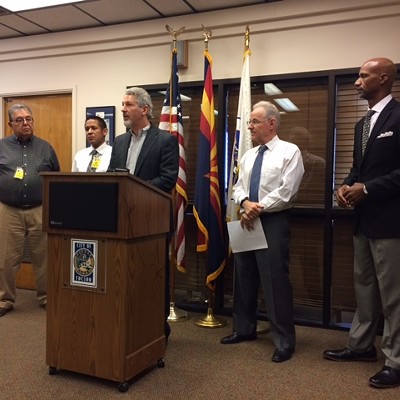Located north of downtown, Dunbar/Spring is a working-class mix of historic bungalows, UA student apartments and a half-dozen social-service agencies, including both a homeless feeding site and the Salvation Army's Hospitality House.
Also found in the neighborhood is a housing project operated by Serving Jesus Christ With Joy, an agency headed by Pastor Randy Lyons and his associate, John Burris. Their Dunbar/Spring facility was established four years ago and houses three staff people and about 50 tenants, eight of whom are on parole, with the others being involved with agencies such as La Frontera, which provides services to those with behavioral health problems.
"We house people who want a stable place to live so they can get their life right," declares Lyons, adding that the tenants are offered counseling, Bible studies and a 12-step program. "They can work day-labor jobs to get on their feet before getting more steady work. That's what we're there for."
Lyons insists his organization does whatever it can to deter criminal activity, and has already taken action. "There are guidelines of no drinking, no drugs and no sex outside marriage," he says. "If people are actively committing crimes, we'll kick them out. We run a pretty tight ship."
At a recent neighborhood association meeting, Burris also pointed out that because of management action, four tenants of the facility had been put back in prison within the last month.
Lyons adds that background information is reviewed on potential residents of the facility. But, he admits, sometimes there are problems, and the police are contacted.
From his perspective, Captain Tom McNally of the Tucson Police Department endorses the cooperation provided by the facility's management. "Pastor Randy has done in the eyes of the law what is expected of him," McNally told about 30 concerned residents attending the neighborhood association meeting. "A lot of people say his facility (is causing crime problems), but that's speculation."
Dunbar/Spring resident Barbara Bixby is outspoken about Lyons' operation. "It's a flop house which has a huge impact on the neighborhood," Bixby says. "There is sex in cars, active drug use and no curfew. I feel very unsafe."
Another critic of the facility is Lila Arey. A few weeks ago, she was accosted in her front yard by two men who stole her bike. "They were both yelling, and one had a bamboo club," Arey remembers. "I felt very threatened."
Reporting the incident to the police, Arey told them she thought the men were from Lyons' apartment house. Their response, she says, was to call that an empty lead.
But the next day, Arey spotted her bike at the facility and retrieved it--while receiving what she characterizes as "guff" from the police for doing so.
However, Lyons wonders about Arey's account of how she got the bike back. Lyons additionally criticizes Arey for not taking time to look at photographs of his tenants to try to identify the men who confronted her. Arey insists she will do that, especially now that another woman in the neighborhood has reportedly been attacked by the same men.
Despite these cases, Capt. McNally calls Dunbar/Spring a safe neighborhood compared to many others in Tucson. Acknowledging there is a hesitancy in the area to contact TPD, which results in artificially low crime statistics, McNally told the neighborhood association, "We're trying to take as much action as possible."
McNally also reports that a recent series of "bait-bike" operations in the area had some results. Leaving bikes in conspicuous places, he says, 10 were taken by thieves who were then apprehended; one of these criminals was connected with Lyons' facility.
From her perspective, Arey asks: "What else needs to happen? People are scared in the neighborhood, and that shouldn't happen. Does one of us need to get raped?"
That sense of urgency was heightened even further just an hour after the neighborhood association meeting, when a participant reported being assaulted on the street by three men.
For his part, Jose Ibarra, who represents the area on the City Council, isn't satisfied with what is going on. He thinks trust and respect among those involved needs to be restored by re-establishing the lines of communication. In addition, he wants TPD to do a better job.
"We need to start responding to calls (faster) and take time to listen to people's concerns, and then follow up," he says. "We need to show that when people call the police, they will get a response and action."
Given current staffing levels, that may be difficult to accomplish. Two years ago, Tucson Police Chief Richard Miranda called for increasing the number of officers substantially to reduce response times (See "Bad Cops. Good Cops. More Cops?" March 25, 2004). Since then, the force has gone from 938 to more than 1,000, and Miranda hopes to add 79 more officers over each of the next five years. But, he indicates, that will mostly just keep pace with growth in the community.
Instead of more police patrols in the neighborhood, a Dunbar/Spring resident who identifies himself only as Patrick wants to take a different approach. "We need to create new solutions," he told the neighborhood association, "that don't include greater police enforcement."
At an earlier meeting attended by about 15 area residents, Patrick and others discussed options to trying to shut down Lyons' housing complex. These included establishing a neighborhood hotline to document thefts and harassment incidents, along with developing a crime questionnaire. "We can't rely on the police," one participant stated, "and we don't want to rely on them."
Whatever direction is taken, Ibarra says he wants to see progress within one month. Lyons, though, blames the problems mostly on his neighbors.
"Some people don't like me," the pastor claims, "and they have a busybody attitude and want to control things."
Calling that opinion "silliness," Bixby takes the opposite view. "Real progress would be Randy Lyons' organization packing up and leaving town," she concludes.












